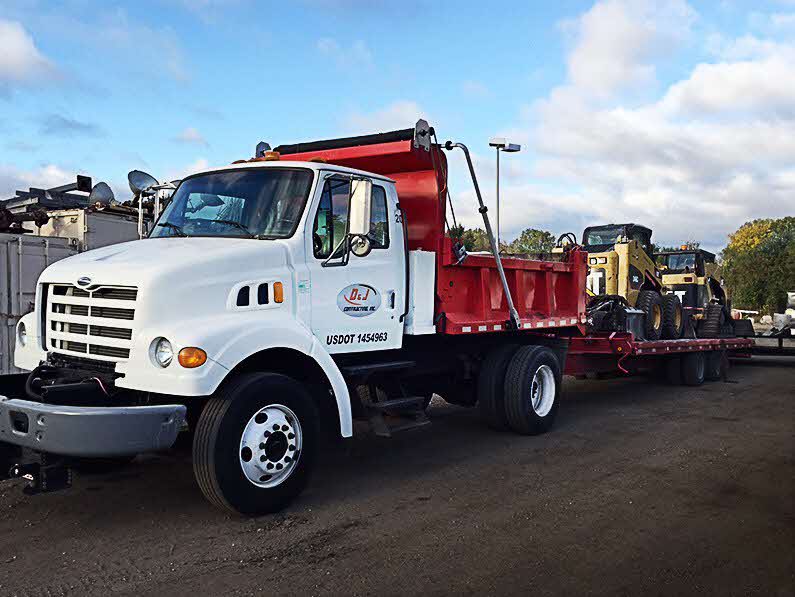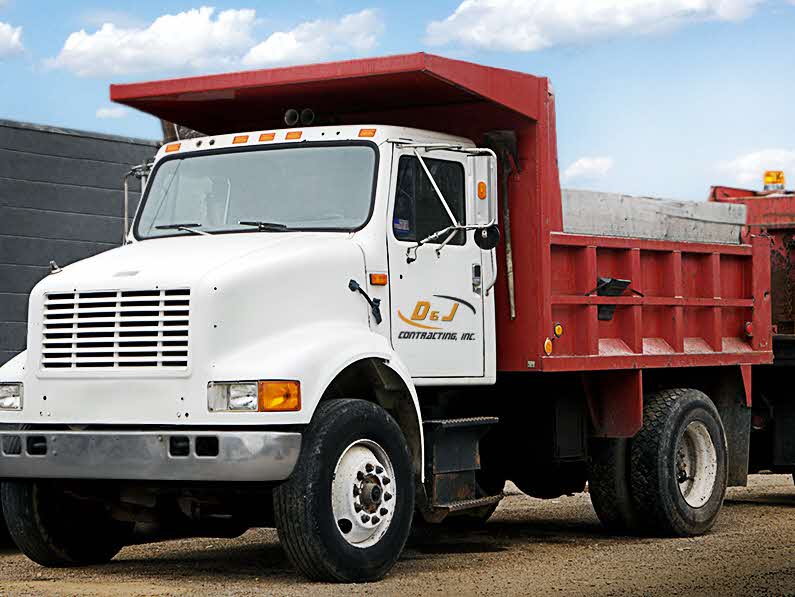Dump Trucking Servicesin Troy MI
Reliable Dump Trucking Services to Meet Your Hauling Needs
We Are Locally Owned & Operated For Over 37 Years
Contact Us Today!
We Serve Businesses In And Around The Following Cities:
About Dump Trucking Services
A Comprehensive Guide to Dump Trucking in Troy
Commercial activity in Troy is seeing an accelerating trend in recent years, demanding corresponding developments in transportation and logistics management to keep up with the pace. One sector that stands out in this expanding scenario is dump trucking. Offering a broad spectrum of services, including dump truck rentals, hauling, and delivery services, dump trucking is a pivotal element in the smooth conduct of commercial operations in the city. This guide will walk you through the process, benefits, and practical applications of dump trucking services in Troy, with a particular emphasis on the advantages for commercial properties.
Dump Trucking: Crucial for Urban Commercial Logistics
Dump trucks are specialized vehicles designed to transport and unload loose material such as sand, gravel, or demolition waste for commercial construction projects. From small dump truck hires to larger fleets, these services play indispensable roles, especially with the myriad of construction, renovating, and restructuring projects that commercial locations require. For instance, companies considering relocation or expansion can use services like dump truck delivery near me to haul away waste material and streamline their operations. D&J Contracting is one of the most reputable providers in the business, offering a range of services for commercial properties in the city of Troy.
Keeping Commercial Operations Smooth with Dump Trucking
Imagine a buzzing commercial site in Troy revamping its premises to accommodate a bigger team, or maybe a new hotel construction rising to intensify the city’s hospitality sector. In such scenarios, partnering with a local dump truck service not only relieves the burden of waste management but also expedites the entire development process with unmatched efficiency. Rough estimates suggest that a majority of commercial facilities in Troy stand to benefit from regular or sporadic usage of dump truck services, given the efficiency and economic sense these bring to the table. Renting a dump truck makes it possible to swiftly get rid of the waste without disrupting the workflow.
Renting vs. Owning: Why Choose Dump Truck Rental Services?
An often pondered question in the commercial sector is whether it’s more beneficial to rent a dump truck or own one. The answer usually lies in a comprehensive analysis of business needs, budget, and long-term plans. Suffice to say; dump truck rental services are often a more feasible choice, especially for new or medium-sized businesses. They are cost-effective, offer flexibility, and save businesses from maintenance and repair hassles. Plus, with a variety of options in dump truck rental rates, businesses can choose the rentals that best fit their budgets. That’s a case where D&J Contracting’s expertise can be put to good use, providing quality dump truck rental at competitive prices.
Setting the Pace with a Good Dump Truck Contractor
Whether you’re dealing with large-scale construction waste, renovating an office space, or managing a logistics company, consistent waste removal is crucial for maintaining a safe and efficient worksite. Here, not just any dump truck service will do; you need a dump truck contractor with proven reliability and professionalism, like D&J Contracting. With tailor-made services to suit each client’s unique needs, they ensure that waste management becomes one less thing for businesses to worry about.
The Practical Use of Dump Trucking in Commercial Properties
Commercial properties ranging from office buildings, schools, hospitals to shopping malls all produce significant amounts of waste. Consequently, there’s a recurrent need for efficient removal and disposal of the same. Scenarios like a school renovation or mall expansion project in Troy, where large amounts of waste are expected, require an efficient dumping service capable of handling the task comfortably. Similarly, logistics companies with warehouses or office spaces frequent the usage of dump trucks for effective waste management. Here, opting for a local dump truck hauler like D&J Contracting can make a world of difference with their steadfast service.
Taking the Next Step with Dump Trucking
In conclusion, it’s evident that dump trucking plays a pivotal role in the functioning of commercial properties in Troy. From efficient waste management to streamlined logistics, these services indeed deliver comprehensive solutions for commercial establishments. By leveraging local expertise such as D&J Contracting in Troy, businesses can experience the fruitful integration of dump trucking services into their daily operations. As this guide has illuminated, the practical usage and benefits are numerous, reinforcing the fact that an effective dump truck service could very well be a game-changer in your commercial property’s daily operations. It’s time to consider making dump trucking a secret advantage in your comprehensive strategy for commercial success.
Dump Trucking Services Gallery


Call Us Today to receive your Free Quote for
Dump Trucking in Troy
Serving: Troy, Michigan

About Troy, Michigan
The earliest recorded purchases of land in what was known as Troy Township occurred in 1819. A couple of years later, a settlement known as Troy Corners was established due to Johnson Niles buying 160 acres in the region. The area is currently the north-central area of Troy. In 1827 Troy Township was established. In 1955, Troy was officially incorporated primarily as a strategy for preventing border cities from taking more land. This also helped to establish more robust city services for Troy residents, whose numbers increased rapidly during this time due to Detroiters fleeing the city for the surrounding suburbs.
It was named after Troy, New York and the ancient city of Troy as many of the early settlers, as in much of Michigan, originated from New York.
According to the United States Census Bureau, the city has a total area of 33.64 square miles (87.13 km), of which 33.47 square miles (86.69 km) is land and 0.17 square miles (0.44 km) (0.51%) is water.
| Census | Pop. | Note | %± |
|---|---|---|---|
| 1960 | 19,402 | — | |
| 1970 | 39,419 | 103.2% | |
| 1980 | 67,102 | 70.2% | |
| 1990 | 72,884 | 8.6% | |
| 2000 | 80,959 | 11.1% | |
| 2010 | 80,980 | 0.0% | |
| 2020 | 87,294 | 7.8% | |
| 2023 (est.) | 87,339 | 0.1% | |
| U.S. Decennial Census 2018 Estimate |
|||
According to a 2018 estimate, the median income for a household in the city was $96,864, and the median income for a family was $113,640. Males had a median income of $72,005 versus $52,365 for females. The per capita income for the city was $46,664. About 5.1% of families and 7.2% of the population were below the poverty line, including 6.7% of those under age 18 and 6.1% of those age 65 or over.
As of the census of 2020, there were 87,294 people, 33,822 households, and 24,300 families living in the city. The population density was 2,609.9 inhabitants per square mile (1,007.7/km). There were 34,953 housing units at an average density of 1,044.9 inhabitants per square mile (403.4/km). The racial makeup of the city was 62.2% White, 4.0% African American, 0% Native American, 27.3% Asian, 1.2% from other races, and 5.1% from two or more races. Hispanic or Latino residents of any race were 2.2% of the population.
There were 33,822 households, of which 35.4% had children under the age of 18 living with them, 60.1% were married couples living together, 8.3% had a female householder with no husband present, 3.4% had a male householder with no wife present, and 28.2% were non-families. 23.2% of all households were made up of individuals, and 10.1% had someone living alone who was 65 years of age or older. The average household size was 2.56 and the average family size was 3.05.
The median age in the city was 43.9 years. 20.7% of residents were under the age of 18; 8.8% were between the ages of 18 and 24; 32% were from 25 to 44; 28.6% were from 45 to 64; and 19.7% were 65 years of age or older. The gender makeup of the city was 50.5% male and 49.5% female.
| Race / Ethnicity (NH = Non-Hispanic) | Pop 2000 | Pop 2010 | Pop 2020 | % 2000 | % 2010 | % 2020 |
|---|---|---|---|---|---|---|
| White alone (NH) | 65,809 | 58,869 | 53,793 | 81.29% | 72.70% | 61.62% |
| Black or African American alone (NH) | 1,678 | 3,210 | 3,422 | 2.07% | 3.96% | 3.92% |
| Native American or Alaska Native alone (NH) | 105 | 124 | 108 | 0.13% | 0.15% | 0.12% |
| Asian alone (NH) | 10,713 | 15,439 | 23,788 | 13.23% | 19.07% | 27.25% |
| Pacific Islander alone (NH) | 18 | 1 | 9 | 0.02% | 0.00% | 0.01% |
| Other race alone (NH) | 79 | 125 | 312 | 0.10% | 0.15% | 0.36% |
| Mixed race or Multiracial (NH) | 1,373 | 1,502 | 2,908 | 1.70% | 1.85% | 3.33% |
| Hispanic or Latino (any race) | 1,184 | 1,710 | 2,954 | 1.46% | 2.11% | 3.38% |
| Total | 80,959 | 80,980 | 87,294 | 100.00% | 100.00% | 100.00% |
As of the census of 2010, there were 80,980 people, 30,703 households, and 22,443 families living in the city. The population density was 2,419.5 inhabitants per square mile (934.2/km). There were 32,907 housing units at an average density of 983.2 per square mile (379.6/km). The racial makeup of the city was 74.1% White, 4.0% African American, 0.2% Native American, 19.1% Asian, 0.6% from other races, and 2.0% from two or more races. Hispanic or Latino residents of any race were 2.1% of the population.
There were 30,703 households, of which 34.7% had children under the age of 18 living with them, 62.8% were married couples living together, 7.3% had a female householder with no husband present, 3.0% had a male householder with no wife present, and 26.9% were non-families. 23.4% of all households were made up of individuals, and 9.6% had someone living alone who was 65 years of age or older. The average household size was 2.63 and the average family size was 3.14.
The median age in the city was 41.8 years. 23.8% of residents were under the age of 18; 6.7% were between the ages of 18 and 24; 24% were from 25 to 44; 31.6% were from 45 to 64; and 13.8% were 65 years of age or older. The gender makeup of the city was 49.3% male and 50.7% female.
From the census of 2000, there were 80,959 people, 30,018 households, and 21,883 families living in the city. The population density was 2,413.9 inhabitants per square mile (932.0/km). There were 30,872 housing units at an average density of 920.5 per square mile (355.4/km). The racial makeup of the city was 82.30% White, 2.09% African American, 0.15% Native American, 13.25% Asian, 0.02% Pacific Islander, 0.36% from other races, and 1.82% from two or more races. 1.46% of the population was Hispanic or Latino of any race.
There were 30,018 households, out of which 36.9% had children under the age of 18 living with them, 64.5% were married couples living together, 6.0% had a female householder with no husband present, and 27.1% were non-families. 22.8% of all households were made up of individuals, and 7.8% had someone living alone who was 65 years of age or older. The average household size was 2.69 and the average family size was 3.23.
In the city 26.2% of the population was under the age of 18, 6.7% from 18 to 24, 29.8% from 25 to 44, 27.1% from 45 to 64, and 10.2% who were 65 years of age or older. The median age was 38 years. For every 100 females, there were 98.1 males. For every 100 females age 18 and over, there were 94.8 males.
From 1990 to 2000, of all of the municipalities in Oakland, Wayne, and Macomb counties, Troy had the highest numeric growth in the Asian population. It had 4,932 Asians according to the 1990 U.S. Census and 10,730 according to the 2000 U.S. Census, an increase of 5,798. The increase gave Troy the largest Asian-American population in the tri-county area, surpassing that of Detroit.
Troy uses the council–manager form of government, and thus is governed by a city council consisting of a mayor and six council members. The current mayor is Ethan Baker, who was elected to a four-year term on November 5, 2019. The city council appoints a City Manager, who manages the day-to-day operations of the city.
The City of Troy and City of Clawson on its southern border compose Michigan’s 41st District for State Representative. The district is currently represented by Padma Kuppa in the State House since 2019, and in the state Senate by Mallory McMorrow, since 2019. The district was previously represented in the State House by Martin Howrylak since 2013, and in the state Senate by Marty Knollenberg, since 2015. On the national level, Troy was part of the 9th district, represented by Joe Knollenberg from 1993 to 2009 and Gary Peters, who defeated Knollenberg in a highly publicized race in November 2008. Nationally, Troy is part of the 11th district, held by Democrat Haley Stevens.
Troy is the location of Walsh College, a business school, as well as branches of the University of Phoenix, Northwood University, Central Michigan University, Spring Arbor University, International Academy of Design and Technology, and Michigan State University.
There are seven school districts serving Troy; however, Troy School District serves the majority of the city limits. The district has multiple elementary schools, four middle schools, and two zoned high schools: Troy High School and Athens High School.
Three school districts have sizable portions of territory in Troy and operate at least one elementary school within the city: Avondale School District, in the north and northwestmost portion of the city; Birmingham City School District, in the southwestmost portion; and Warren Consolidated Schools, in the southeast, which operates Susick Elementary within the city. In addition, two other school districts are located in part in Troy but have no schools within the city limits: Bloomfield Hills School District, with a portion of the northwest part of the city, and Royal Oak School District, which has a very small portion of the southern part of the city. Finally, a small area of commercial property also in the south lies within the borders of Lamphere Public Schools
The Troy School District also hosts the eastern campus of the International Academy. Private schools include Bethany Christian School, Brookfield Academy, Oakland Children’s Academy, St. Mark Christian Academy and Troy Adventist Academy.
Call Us Today to receive your Free Quote for
Dump Trucking in Troy
Related Services in Troy, Michigan
We Serve Businesses In The Following Zip Codes:
48007, 48015, 48021, 48026, 48035, 48036, 48038, 48042, 48043, 48044, 48045, 48046, 48047, 48048, 48050, 48051, 48066, 48071, 48080, 48081, 48082, 48083, 48084, 48085, 48088, 48089, 48090, 48091, 48092, 48093, 48098, 48099, 48225, 48230, 48236, 48310, 48311, 48312, 48313, 48314, 48315, 48316, 48317, 48318, 48397